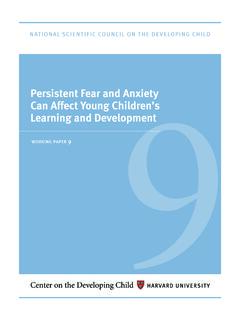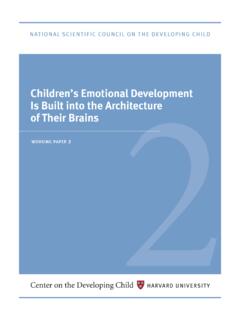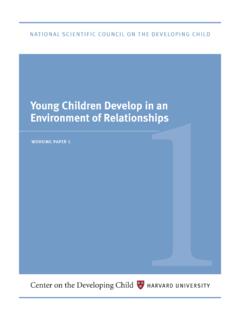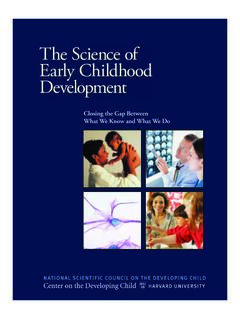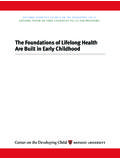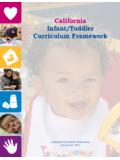Transcription of Young children Develop in an environment of relationships
1 Young children Develop in an environment of relationshipsworking paper 11members Jack p. shonkoff, , chairJulius B. Richmond FAMRI Professor of Child Health and Development; Director, Center on the Developing Child, Harvard Universityw. thomas boyce, Hill Health Centre/BC Leadership Chair in Child Development; Professor, Graduate Studies and Medicine, University of British Columbia, VancouverJudy cameron, of Psychiatry, University of Pittsburgh; Senior Scientist, Oregon National Primate Research Center; Professor of Behavioral Neuroscience and Obstetrics & Gynecology, Oregon Health and Science Universitygreg J. Duncan, Professor, Department of Education,University of California, Irvinenathan a. fox, Professor; Director, Child Development Laboratory, University of Maryland College Parkmegan r.
2 Gunnar, Professor and Distinguished McKnight University Professor, Institute of Child Development, University of Minnesotapat levitt, , Zilkha Neurogenetic Institute; Provost Professor of Neuroscience, Psychiatry and Pharmacy Chair, Department of Cell and Neurobiology, Keck School of Medicine of the University of Southern Californialinda c. mayes, Arnold Gesell Professor of Child Psychiatry, Pediatrics, and Psychology, Yale Child Study Center Special Advisor to the Dean, Yale School of Medicinebruce s. mcewen, E. Mirsky Professor; Head, Harold and Margaret Milliken Hatch Laboratory of Neuroendocrinology, The Rockefeller Universitycharles a. nelson, David Scott Chair in Pediatric Developmental Medicine Research, children s Hospital Boston; Professor of Pediatrics and Neuroscience, Harvard Medical Schoolross a.
3 Thompson, of Psychology, University of California, Daviscontributing members susan nall balesPresident, FrameWorks Institutewilliam t. greenough, Professor of Psychology, Psychiatry, and Cell and Developmental Biology; Director, Center for Ad vanced Study at University of Illinois, Urbana-Champaigneric knudsen, C. and Amy H. Sewall Professor of Neurobiology, Stanford University School of MedicineDeborah phillips, of Psychology and Associated Faculty, Public Policy Institute; Co-Director, Research Center on children in the , Georgetown Universityarthur J. rolnick, Vice President and Director of Research, Federal Reserve Bank of Minneapolisformer members betsy lozoff, of Pediatrics, University of Michigan Medical School; Research Professor. Center for Human Growth and Development, University of Michiganpartners the frameworks institutethe national governors association center for best practicesthe national conference of state legislaturessponsors the birth to five policy alliance the buffett early childhood fund the John D.
4 And catherine t. macarthur foundation Palix foundationthe pierre and pamela omidyar fundabout the authorsThe National Scientific Council on the Developing Child, housed at the Center on the Developing Child at Harvard University, is a multi-disciplinary collaboration designed to bring the science of early childhood and early brain development to bear on public decision- making. Established in 2003, the Council is committed to synthesizing and communicating science to help inform policies that promote successful learning, adapative behavior, and sound physical and mental health for all Young children . For more information, go to note: The content of this paper is the sole responsibility of the authors and does not necessarily represent the opinions of the funders or citation: National Scientific Council on the Developing Child.
5 (2004). Young children Develop in an environment of relationships . Working Paper No. 1. Retrieved from 2004, National Scientific Council on the Developing Child, Center on the Developing Child at Harvard UniversityUpDaTeD & reprinTeD: oCToBer Young children Develop in an environment of relationships 1 Growth-promoting relationships are based on the child s continuous give-and-take ( serve and return interaction) with a human partner who provides what nothing else in the world can offer experiences that are individualized to the child s unique personality style; that build on his or her own interests, capabilities, and initiative; that shape the child s self-awareness; and that stimulate the growth of his or her heart and children experience their world as an environment of relationships , and these re-lationships affect virtually all aspects of their development intellectual, social, emotional, physical, behavioral, and moral.
6 The quality and stability of a child s human relationships in the early years lay the foundation for a wide range of later developmental outcomes that re-ally matter self-confidence and sound men-tal health, motivation to learn, achievement in school and later in life, the ability to control ag-gressive impulses and resolve conflicts in non-violent ways, knowing the difference between right and wrong, having the capacity to Develop and sustain casual friendships and intimate re-lationships, and ultimately to be a successful parent simply, relationships are the ac-tive ingredients of the environment s influ-ence on healthy human development. They incorporate the qualities that best promote competence and well-being individualized responsiveness, mutual action-and-interac-tion, and an emotional connection to another human being, be it a parent, peer, grandpar-ent, aunt, uncle, neighbor, teacher, coach, or any other person who has an important impact on the child s early development.
7 relationships engage children in the human community in ways that help them define who they are, what they can become, and how and why they are important to other people. 7, 8, 9, 10, 11, 12, 13In the words of the distinguished Develop -mental psychologist Urie Bronfenbrenner: ..in order to Develop normally, a child requires pro-gressively more complex joint activity with one or more adults who have an irrational emotional relationship with the child. Somebody s got to be crazy about that kid. That s number one. First, last, and and stable relationships with caring adults are essential to healthy human development beginning from birth. Early, se-cure attachments contribute to the growth of a broad range of competencies, including a love of learning, a comfortable sense of one-self, positive social skills, multiple successful relationships at later ages, and a sophisti-cated understanding of emotions, commit-ment, morality, and other aspects of human relationships .
8 Stated simply, establishing suc-cessful relationships with adults and other children provides a foundation of capacities that children will use for a , 15, 16, 17 the issuehealthy development depends on the quality and reliability of a Young child s relationships with the important people in his or her life, both within and outside the family. Even the development of a child s brain architecture depends on the establishment of these , 2, 3, 4, 5, 6what science tells usYoung children experience their world as an environment of relationships , and these relationships affect virtually all aspects of their Young children Develop in an environment of relationships scientific council on the Developing chilDthe serve and return interaction between par-ent and baby in which Young children naturally reach out for interaction through babbling, facial expressions.
9 And gestures and adults respond with the same kind of vocalizing and gesturing back at them builds and strengthens brain ar-chitecture and creates a relationship in which the baby s experiences are affirmed and new abili-ties are nurtured. children who have healthy relationships with their primary caregivers are more likely to Develop insights into other peo-ple s feelings, needs, and thoughts, which form a foundation for cooperative interactions with others and an emerging conscience. Sensitive and responsive parent-child relationships also are associated with stronger cognitive skills in Young children and enhanced social compe-tence and work skills later in school, which illus-trates the connection between social/emotional development and intellectual growth.
10 The broader quality of the home environment (in-cluding toys, activities, and interactions with-in the family setting) also is strongly related to early cognitive and language development, performance on IQ testing, and later achieve-ment in , 18, 19, 20, 21, 22, 23, 24, 25, 26 Young children also learn a great deal from each other. they learn how to share, to engage in re-ciprocal interactions ( , taking turns, giving and receiving), to take the needs and desires of others into account, and to manage their own im-pulses. Just being around other children , how-ever, is not enough. The development of friend-ships is essential, as children learn and play more competently in the rapport created with friends rather than when they are dealing with the social challenges of interacting with casual acquaintances or unfamiliar , 28 the warmth and support of the caregiver in a child care setting also influence the development of important capabilities in children , includ-ing greater social competence, fewer behavior problems, and enhanced thinking and reasoning skills at school age.
